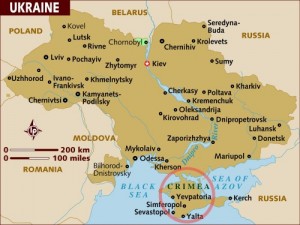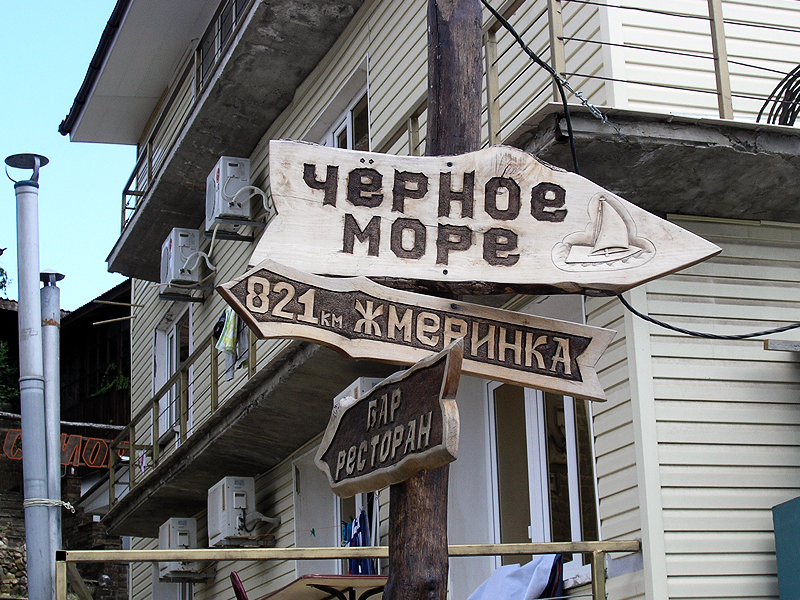This article was originally published on 10th September 2014 in the Sydney Globalist.
In this piece Olga Oleinikova & Oleg Skrypka explore daily life in post-referendum Crimea. Twelve “personal” stories from residents of Simferopol and Sevastopol explore concepts such as identity and belonging.
A tense political situation between Russia and Ukraine has been simmering over recent months. A small peninsula in the Black Sea called Crimea became a source of controversy, political debate and international sanctions against Russia. Since 1783, as the result of the RSFSR (Russian Soviet Federative Socialist Republic) aftermath, the territory of the peninsula has belonged to the Russian Empire. In Soviet times, according to Khrushchev’s 1954 decree, Crimea was presented to the Ukrainian Soviet Socialist Republic (USSR). After the collapse of the Soviet Union in 1991, Crimea, with autonomous status, remained a part of Ukraine.

Photo Credit: P.L., Flickr CC
The political crisis during late 2013 and early 2014 led to the secession of Crimea from Ukraine and reunification with Russia. This is a political situation that no doubt suits Vladimir Putin, bolstering his chances at the next election. In March 2014 the decision about the annexation of the Autonomous Republic of Crimea (ARC) was unquestionably made in unilateral manner, but it did not carry any military violence. However, the presence of Russian military forces at the time of the Crimean referendum is undeniable. The secession of Crimea is the first bloodless take over in Russian history. This scenario became possible only with strong support of the local population in Crimea. The majority of the Crimeans interviewed for this piece noted that it was the not the annexation of Crimea, with many stating that they “decided their fate themselves” in the referendum. Others stressed that Crimea has never been purely Ukrainian. “If you examine the history of Crimea, Scythians and Greeks inhabited this territory, from the 14th century – the Tatars. The Turks, the British, and French invaded the Crimea. In XVIII century, Catherine II united Crimea with Russia, by the way with the consent of the Tatar Khanate. Tatars were exhausted by constant attacks from the outside,” explains Nikolai, a 62-year-old civil engineer.
These attitudes were confirmed by the referendum regarding the status of Crimea held on March 16, 2014, which asked the population of the ARC and Sevastopol whether they wanted to join Russia as a federal subject, or whether they wanted to restore the 1992 Crimean Constitution and Crimea’s status as a part of Ukraine. 96.77% in the ARC and 95.6% in Sevastopol supported the reunification of Crimea with Russia. On March 18, 2014 an agreement was signed declaring the Republic of Crimea and the city of Sevastopol (Ukrainian territory 1954 – 2014) a part of the Russian Federation. Ukraine and the West have not recognized the declaration of independence of Crimea, nor its entry into Russia.
Since numerous news sources, international and Ukrainian, present distorted data or are politically biased, 12 locals in Crimea were interviewed to provide insight into current attitudes in Crimea and post-referendum life on the peninsular. All respondents were asked the following questions: (1) How do you feel about the fact that Crimea joined Russia as a subject of the Russian Federation? (2) What in your opinion caused the disconnection of Crimea from Ukraine? (3) How did you vote in the referendum and did you apply for Russian citizenship? (4) How do you see the future of Crimea and your own future now?
Out of a dozen respondents only four participated in the referendum. It is interesting that in the case of all twelve respondents participated, seven of them would have voted for reunification with Russia. These facts suggest that the results of the referendum are not open and transparent, and that in the case of full transparency and 100% turnout, the results would look more like 70 – 75% in support of Russia.
Some of the interviewed Crimean residents explained their absence from the referendum by claiming that “the majority would vote for reunification with Russia anyway.” Crimean Tatars completely boycotted the referendum. Tatars largely support Ukraine’s current politics and thus European integration. They are scared of possible deportations from Crimean territory.
Alim, an interviewed Crimean Tatar, stated: “I do not link my future to Russia, I suppose I will have to leave my Motherland again. Once, we, Tatars, were kicked out [during the 1944 deportation under Soviet rule]. I have fears that we, indigenous people, will be oppressed in many ways again. I will never take Russian citizenship and I did not vote in the referendum. It was illegal and absurd.”
Throughout the interview Alim and many other Tatars recalled the state-organized deportation of the Crimean Tatars from the Crimean Peninsula by the Soviet Union in 1944. The forced deportation was ordered by Joseph Stalin as a form of collective punishment for alleged collaboration with the Nazi occupation regime in Taurida Subdistrict during 1942-1943. The event is also known as Sürgünlik to Crimean Tatars (meaning “exile”). Tatars interviewed for this piece appeared to be fearful about the repeat of such a situation under Russian rule.
Despite the dominant attitude among the Tatars being negativity towards Russia, it could be said that the vast majority of population on the Crimean Peninsula were pleased about becoming a part of Russia.
Interviewees stated that life in Crimea after the referendum is positively changing and rebuilding. Many problems, such as the re-registration of property, change of mobile operators, introduction of new banking system, examination of and adoption of new legislation, do not scare Crimeans. The majority does not appear to be afraid of current hardships.
Euphoria from the reunification with Russia has not been lost yet, as the population believes that after complete integration with the Russian Federation Crimea will start new life with higher wages, with development of small and medium-sized businesses and advanced tourism infrastructure. Several respondents talked about “moral satisfaction” from unification with Russia.
“For the first time in many years, Crimeans saw real fireworks over the town square. The government no longer saves money on Crimea. Russia has introduced financial support schemes to help industries to restore their economic power. An important thing is that for the first time in many years residents of Crimea felt what patriotism is, what the Russian spirit is and how much of it is there – behind the Kerch Strait. Now everyone again feels that there is a large real Motherland!” – says a 25 year- old lawyer.
According to the majority of Crimeans, the split occurred in the country due to differences in history and contrary values between the western and southeastern regions of Ukraine.
All respondents, except Crimean Tatars, are very positive about the prosperous future of Crimea. They believe that establishment of a special economic zone on the territory of the Republic of Crimea will inevitably lead to increase in the economic activity and the development of infrastructure on the peninsula. Some Crimeans are not in a hurry to get Russian passports, while others want to become full citizens of the Russian Federation as soon as possible to move freely in its territory, to enter universities, or to get jobs in their professions.
Despite the euphoria, age was a key factor in determining opinions of Crimeans from the inside of the Republic of Crimea. Young people are ambivalent, afraid and perplexed; many of them feel more Ukrainian than ever before. Older generations who remember Soviet times are strongly linked with Russia. For example, a 62-year-old young civil engineer, expressed the following feelings about the situation.
“My attitudes to the whole situation are positive. Today all Crimeans are tired of the persistent Ukrainianisation and centralization during the past 23 years of Ukrainian independence. We were constantly told what language to communicate in, in what language to write. Political instability and chaos in Ukraine was the main cause of Crimean reunification with Russia. Thus, we held a referendum and decided to live in a country that protects citizen’s rights and stops the lawlessness fuelled by the “rulers” of Ukraine, who are themselves dividing people of the country into the West and the East. The referendum was held openly, there was no pressure from the Crimean leadership. My family, consisting of five people, voted unanimously for entry into Russia. Previously, my children did not participate in elections. I can also say that my neighbours almost unanimously voted to join Russia.”
Ukrainians and Russians, both living abroad and in the epicenter of the events, still continue to actively discuss the secession of Crimea and its possible return to Ukraine. These discussions are full of both overtly anti-Russian and pro-Russian attitudes. Ukraine still hopes to return Crimea. For many Ukrainians living in mainland Ukraine, it seems that Crimeans need to be rescued from Russia. But an invasion would be a mistake, which could possibly lead to war, because the majority of Crimeans have already decided on their future – their Russian future.
Olga Oleinikova & Oleg Skrypka are PhD researchers at the University of Sydney.
Featured Image Credit: Elena Pleskevich, Flickr CC. License available here.
